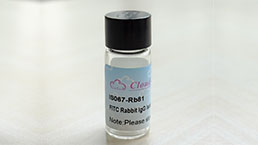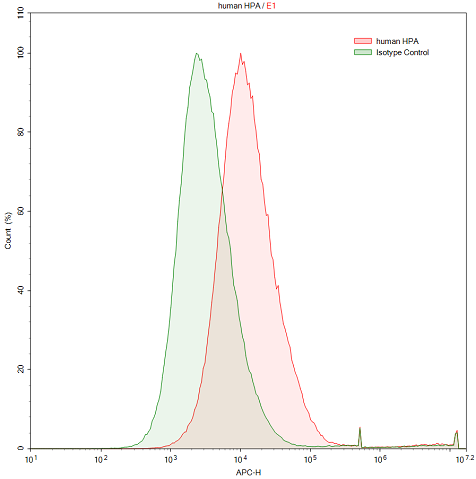Anti-Heparanase (HPSE) Polyclonal Antibody 

HPA; HPR1; HPSE1; HSE1; Endo-glucoronidase;
- UOM
- FOB US$ 120.00 US$ 200.00 US$ 320.00 US$ 400.00 US$ 700.00
- Quantity
Overview
Properties
- Product No.FAA711Hu01
- Organism SpeciesHomo sapiens (Human) Same name, Different species.
- ApplicationsFCM
Research use only - Downloadn/a
- CategoryEnzyme & Kinase
- Ig Type IgG, Potency n/a
- PurificationAntigen-specific affinity chromatography followed by Protein A affinity chromatography
- LabelNone
- Excitation LaserNone
- Vol. per test1-5 µl
- Buffer Formulation0.01M PBS, pH7.4, containing 0.05% Proclin-300, 50% glycerol.
- TraitsLiquid
Share your citation
Upload your experimental result
Review
Leave a message
Loading...
Sign into your account
Share a new citation as an author
Upload your experimental result
Review
Please attach serial No. on instruction manual


Contact us
Please fill in the blank.
Name*
Organization
Address
E-mail address*
Telephone
Inquiry*
Verification code*

Usage
For flow cytometry, the suggested use of this reagent is 1-5 µl per 10^6 cells in 100 µl volume.
Optimal working dilutions could be determined by end user.
Storage
Store at 4°C for frequent use. Stored at -20°C in a manual defrost freezer for one year without detectable loss of activity. Avoid repeated freeze-thaw cycles.
Giveaways
Increment services
-
 Protein A/G Purification Column
Protein A/G Purification Column
-
 Positive Control for Antibody
Positive Control for Antibody
-
 Tissue/Sections Customized Service
Tissue/Sections Customized Service
-
 Phosphorylated Antibody Customized Service
Phosphorylated Antibody Customized Service
-
 Flow Cytometry (FCM) Experiment Service
Flow Cytometry (FCM) Experiment Service
-
 Immunoprecipitation (IP) Experiment Service
Immunoprecipitation (IP) Experiment Service
-
 Immunofluorescence (IF) Experiment Service
Immunofluorescence (IF) Experiment Service
-
 Buffer
Buffer
-
 DAB Chromogen Kit
DAB Chromogen Kit
-
 SABC Kit
SABC Kit
-
 Isotype Control
Isotype Control
-
 Real Time PCR Experimental Service
Real Time PCR Experimental Service
Citations
- PG545, a Heparan Sulfate Mimetic, Reduces Heparanase Expression In Vivo, Blocks Spontaneous Metastases and Enhances Overall Survival in the 4T1 Breast Carcinoma ModelPlosone: Source
- Assessment of heparanase and heparin-binding growth and angiogenesis factors in the uterine cavity ? uid in women with impaired reproductionNowinylekarskie:Source
- Unfractionated heparin attenuates intestinal injury in mouse model of sepsis by inhibiting heparanasePubMed: 26191183
- PI-88 inhibits postoperative recurrence of hepatocellular carcinoma via disrupting the surge of heparanase after liver resectionPubMed: 26415733
- Assessment of heparanase and heparin-binding growth and angiogenesis factors in the uterine cavity fluid in women with impaired reproductionarticle:84
- Plasma heparanase is associated with blood glucose levels but not urinary microalbumin excretion in type 2 diabetic nephropathy at the early stage pubmed:28994624






